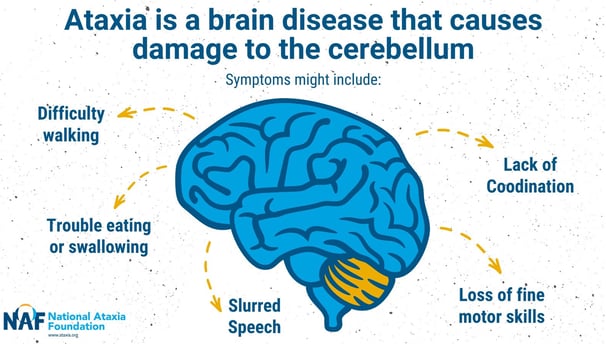Ataxia is a collective term for a family of disorders affecting; Balance, Coordination, Dysphagia, Eyesight and Speech.
Ataxia is similar to Multiple Sclerosis (MS), as both affect movement and coordination.
Types of Ataxia
I live with a condition known as cerebellar ataxia, which developed as a complication following the surgical removal of a brain tumor. This condition has profoundly impacted my life, especially my mobility and motor skills.
I cannot walk due to limited mobility in my legs, so I rely on a motorised wheelchair to move around. This has been a significant adjustment, and while the wheelchair provides some independence, it also serves as a constant reminder of my limitations.
Fine motor tasks are especially challenging for me. Simple actions like typing on a keyboard, which many take for granted, are agonizingly slow and frustrating. Each keystroke is an effort, making communication via text a tedious process.
My speech has also been severely affected. It’s difficult for me to articulate words clearly, making verbal communication a challenge. Modern advancements like speech recognition software, which could have been a lifeline, are frustratingly ineffective for me due to my impaired speech clarity.
Even everyday tasks, like eating or cleaning my teeth, can be perilous. Due to my lack of coordination, what should be routine can sometimes result in accidentally hurting myself, like self-stabbing while trying to eat. It’s a constant battle, requiring immense concentration for even the smallest of actions.
Living with cerebellar ataxia is a daily challenge, filled with hurdles that I continuously strive to overcome.
My Ataxia
Acquired Ataxia
•Cerebellar Ataxia: Results from damage to the cerebellum due to stroke, tumor, alcohol abuse, or other causes.
•Sensory Ataxia: Caused by damage to the nerves that provide sensory feedback for spatial positioning.
•Vestibular Ataxia: Arises from problems in the inner ear and the vestibular system, affecting balance.
Genetic Ataxia
•Friedreich’s Ataxia: A hereditary disease that typically arises in childhood and involves progressive damage to the nervous system.
•Spinocerebellar Ataxias (SCAs): A group of hereditary ataxias that vary in symptoms and age of onset.
•Ataxia-Telangiectasia: A rare, inherited disorder that affects the nervous system, immune system, and other body systems.
•Episodic Ataxia: Characterized by attacks or episodes of ataxia symptoms, often triggered by stress, fatigue, or certain substances.
Ideopathic Ataxia
• Cases where the cause of ataxia is unknown despite thorough investigationbstances.
Living with ataxia: 'People just think we're drunk'
Ataxia effects 10,500 adults and children in the UK
The number of people living with ataxia in the UK can fluctuate over time. This fluctuation can be due to several factors
1.New Diagnoses: As medical technology and awareness of ataxia improve, more people may be diagnosed, increasing the number. 2.Demographic Changes: Changes in the population size and age distribution can affect the prevalence of ataxia. 3.Advancements in Treatment: Improved treatments might prolong the lives of those with ataxia, affecting the total number of people living with the condition at any given time. 4.Natural Population Changes: Birth rates, death rates, and migration can all influence the number of people with ataxia in a given area.




